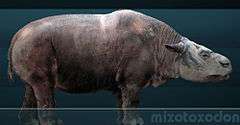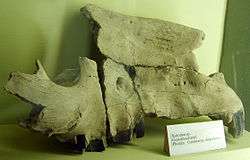Toxodontidae
Toxodontidae is an extinct family of notoungulate mammals, known from the Oligocene to the Holocene (11,000 BP) of South America,[1] with one genus, Mixotoxodon, also known from the Pleistocene of Central America and southwestern North America (Texas).[2] They somewhat resembled rhinoceroses, and had teeth with high crowns and open roots, suggesting that they often fed on tough pampas grass.[3] However, isotopic analyses have led to the conclusion that the most recent forms were grazing and browsing generalists.[4]
| Toxodontidae | |
|---|---|
 | |
| Mixotoxodon larensis | |
| Scientific classification | |
| Kingdom: | Animalia |
| Phylum: | Chordata |
| Class: | Mammalia |
| Order: | †Notoungulata |
| Family: | †Toxodontidae Owen 1845 |
| Subfamilies and genera | |
|
†Haplodontheriinae
†Nesodontinae
| |

Taxonomy
The endemic notoungulate and litoptern ungulates of South America have been shown by studies of collagen and mitochondrial DNA sequences to be a sister group to the perissodactyls.[5][6][7]
In 2014, a study identifying a new species of toxodontid resolved the families phylogenetic relations. The below cladogram was found by the study:[8]
| |||||||||||||||||||||||||||||||||||||||||||||||||||||||||||||||||||||||||||||||||||||||||||||||||||||||||||||||||||||||||||||||||||||||||||||||||
References
- Turvey, Samuel T. (2009-05-28). Holocene Extinctions. OUP Oxford. ISBN 9780191579981.
- E. Lundelius, et al. 2013. The first occurrence of a toxodont (Mammalia, Notoungulata) in the United States. Journal of Vertebrate Paleontology, Vol 33, No 1, pp. 229–232 DOI:10.1080/02724634.2012.711405
- Palmer, D., ed. (1999). The Marshall Illustrated Encyclopedia of Dinosaurs and Prehistoric Animals. London: Marshall Editions. p. 253. ISBN 978-1-84028-152-1.
- MacFadden, Bruce J. (September 2005). "Diet and habitat of toxodont megaherbivores (Mammalia, Notoungulata) from the late Quaternary of South and Central America". Quaternary Research. 64 (2): 113–124. Bibcode:2005QuRes..64..113M. doi:10.1016/j.yqres.2005.05.003.
- Welker, F.; Collins, M. J.; Thomas, J. A.; Wadsley, M.; Brace, S.; Cappellini, E.; Turvey, S. T.; Reguero, M.; Gelfo, J. N.; Kramarz, A.; Burger, J.; Thomas-Oates, J.; Ashford, D. A.; Ashton, P. D.; Rowsell, K.; Porter, D. M.; Kessler, B.; Fischer, R.; Baessmann, C.; Kaspar, S.; Olsen, J. V.; Kiley, P.; Elliott, J. A.; Kelstrup, C. D.; Mullin, V.; Hofreiter, M.; Willerslev, E.; Hublin, J.-J.; Orlando, L.; Barnes, I.; MacPhee, R. D. E. (2015-03-18). "Ancient proteins resolve the evolutionary history of Darwin's South American ungulates". Nature. 522 (7554): 81–84. Bibcode:2015Natur.522...81W. doi:10.1038/nature14249. ISSN 0028-0836. PMID 25799987.
- Buckley, M. (2015-04-01). "Ancient collagen reveals evolutionary history of the endemic South American 'ungulates'". Proceedings of the Royal Society B: Biological Sciences. 282 (1806): 20142671. doi:10.1098/rspb.2014.2671. PMC 4426609. PMID 25833851.
- Westbury, M.; Baleka, S.; Barlow, A.; Hartmann, S.; Paijmans, J. L. A.; Kramarz, A.; Forasiepi, A. M.; Bond, M.; Gelfo, J. N.; Reguero, M. A.; López-Mendoza, P.; Taglioretti, M.; Scaglia, F.; Rinderknecht, A.; Jones, W.; Mena, F.; Billet, G.; de Muizon, C.; Aguilar, J. L.; MacPhee, R. D. E.; Hofreiter, M. (2017-06-27). "A mitogenomic timetree for Darwin's enigmatic South American mammal Macrauchenia patachonica". Nature Communications. 8: 15951. Bibcode:2017NatCo...815951W. doi:10.1038/ncomms15951. PMC 5490259. PMID 28654082.
- Forasiepi, A. A. M.; Cerdeño, E.; Bond, M.; Schmidt, G. I.; Naipauer, M.; Straehl, F. R.; Martinelli, A. N. G.; Garrido, A. C.; Schmitz, M. D.; Crowley, J. L. (2014). "New toxodontid (Notoungulata) from the Early Miocene of Mendoza, Argentina". Paläontologische Zeitschrift. 89 (3): 611–634. doi:10.1007/s12542-014-0233-5.
Further reading
- McKenna, Malcolm C., and Bell, Susan K. 1997. Classification of Mammals Above the Species Level. Columbia University Press, New York, 631 pp. ISBN 0-231-11013-8